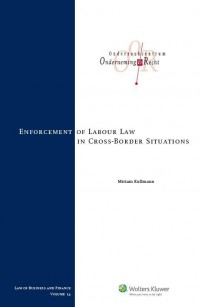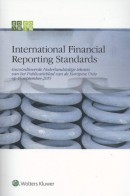Product informatie
- ISBN 9789013128659
- ISBN 10 9013128653
- Druk 1
- Bindwijze Paperback
- Taal Nederlands
- Uitgever Wolters Kluwer
- Onderwerp Ondernemingsrecht
- Beschikbaar sinds 4 Februari 2015
Samenvatting
The enforcement of labour law in cross-border worker situations increasingly gains attention at EU and Member State level. Especially due to the EU enlargements in 2004 and 2007 and the huge wage differences that exist across the EU Member States have boosted exercising the free movement of workers and the posting of workers. These developments have raised the awareness that enforcement of labour law is crucial and should be put high on the EU\'s and Member States\' agenda. This book addresses an important question: in which ways and to what extent do EU rules and EU case law exert influence on the Dutch, German, and Swedish methods to monitor and enforce labour law in transnational situations? This question is examined for labour law in terms of minimum wages, minimum holiday pay, ... and minimum holiday allowances. Moreover, a sectoral approach by taking the construction and the temporary agency work sector as examples provides insights into the enforcement strategies of the social partners. There is no role for the EU (institutions) to enforce workers\' rights at Member State level. Member States themselves are responsible for enforcing the rights foreign workers derive from EU law. At Member State level, three enforcement methods can be distinguished: the judicial (civil or labour court), the industrial relations (social partners), and the administrative enforcement (labour inspectors) method. The ECJ has established jurisprudential requirements (the principles of equivalence and effectiveness) that serve as a floor for Member State enforcement methods. Besides, to a certain extent EU rules provide guidance on how Member State enforcement methods should be construed, of which the in April/May 2014 adopted Posted Workers Enforcement Directive and the Union Workers Enforcement Directive are two recent examples. While this \'floor\' seems to be easily met by the enforcement methods available at Member State level, difficulties arise in the context of the posting of workers, a form of worker mobility that is based on the freedom to provide services. The right of the employer to provide cross-border services puts a ceiling on the Member State possibilities to adequately monitor and enforce the rights of posted workers. As a result, due to the floor and ceiling caused by EU rules and EU case law, it becomes a balancing act for Member States\' enforcement methods. This study shows the main differences as well as the similarities that exist between the enforcement methods in these countries. It makes clear that enforcement of the rights of workers in cross-border situations has become increasingly difficult for Member States. This book provides an in-depth overview of how Germany, the Netherlands, and Sweden monitor and enforce the rights of mobile workers by describing the three enforcement methods available in all three countries. Enforcement of labour law does only work if all three enforcement methods are used. This study makes clear that there is no one-size-fits-all enforcement method that could be similarly applied in all Member States. This book provides valuable information to academia, practitioners as well as policy-makers at EU and at Member State level.
Meer boeken van uitgever Wolters Kluwer
Meer boeken met de onderwerpen Ondernemingsrecht
Veel gestelde vragenmeer antwoorden
Hoe werkt Resale.nl?
Je kunt op de website advertentie(s) plaatsen van de boeken die u wilt verkopen. Een potentiële koper neemt dan contact met je op om samen een prijs af te spreken en de transactie verder af te handelen. Houdt hierbij onze aanbevelingen voor een veilige transactie in gedachten en voorkomt dat je slachtoffer wordt van oplichting.
Hoe kom ik in contact met de verkoper?
Je kunt een reactie versturen door bij de betreffende advertentie van de verkoper op de knop ‘doe een bod’ te drukken. Je kunt nu een bod doen op de advertentie en een persoonlijk bericht toevoegen. Het verstuurde bod brengt je in contact met de verkoper via e-mail.
Wat zijn de kosten voor het verkopen van mijn studieboeken?
Je kunt geheel gratis gebruik maken van de diensten van Resale.nl. Resale.nl haalt zijn inkomsten uit advertenties.
Hoe kan ik een boek kopen?
Resale.nl werkt globaal op de volgende manier:
- Zoek via het zoekveld het studieboek dat je wilt kopen.
- Uit de zoekresultaten kies je het studieboek waar je geïnteresseerd in bent.
- Op de detailpagina van het studieboek kun je een overzicht vinden van de personen die het studieboek verkopen.
- Je kunt nu een bod plaatsen door op de button te klikken. Het bod wordt via e-mail aan de verkoper verzonden.
- De verkoper van het studieboek neemt contact met je op door een reactie te geven op het bod dat je hebt verzonden. Met de verkoper kun je gezamenlijk een prijs afspreken. Houdt hierbij onze aanbevelingen voor een veilige overdracht in gedachten en voorkom dat u slachtoffer wordt van oplichting.
Hoe weet ik wat ik koop?
Om te achterhalen of wat je koopt ook daadwerkelijk is wat er wordt geadverteerd is het verstandig om bij de verkoper langs te gaan en het aangebodene te bezichtigen. Doe je dit niet, dan loopt je een zeker risico. Onder het kopje ‘Hoe kan ik de kans op misbruik verkleinen’ kun je meer over dit onderwerp vinden.
Kopers over Resale.nl
bart van gijsel
"Ik ben erg tevreden over deze verkoper de familie thus. Goede snelle levering."
Patrice Michel
"De verkoper heeft er alles aan gedaan om het door mij bestelde product zo snel mogelijk naar mij toe te krijgen. Heeft me van iedere stap op de hoogte ..."
marjolein
"Besteeling snel bezorg, in goede staat net zoals beschrijving en goede communicatie met verkoper!"
marjolein
"Goed contact, snel en in goede orde ontvangen. Staat van het boek was zo goed als nieuw!"
hilda1
"goede medewerking en hulp dank u wel"
Tineke
"Het bestelde werd netjes en snel afgeleverd. De prijs was goed."
stacy
"Goed verpaktBoek ziet er mooi uit"
elisa
"Goede levering alleen jammer dat er niet bij was gezet dat er al in geschreven was"
Elly
"Verkoper reageerde snel op mijn emails en heeft ook het boek snel opgestuurd.Het boek was niet van nieuw te onderscheiden. Was waarschijnlijk niet gebruikt. ..."
Gerard+[2]
"Prettig contact gehad en goed zaken kunnen doen."
















